Key Concepts - Electoral Politics | Social Studies (SST) Class 9 PDF Download
| Table of contents |

|
| What are Elections and why are they Important? |

|
| What is our System of Elections? |

|
| Election Campaign |

|
| Challenges to Free and Fair Elections |

|
What are Elections and why are they Important?
Elections are a vital process in a democracy, allowing citizens to choose representatives for decision-making. In large communities, daily collective decision-making is impractical, making elections essential. While alternative criteria like age or education could select representatives, elections provide a democratic mechanism for accountability. They enable citizens to express preferences, choose lawmakers, form governments, and guide policies. Elections ensure periodic evaluation and the possibility of change, making them a fundamental aspect of representative democracies.
 Election in India
Election in India
Assembly Election in Haryana
- Chaudhary Devi Lal's Lok Dal won the 1987 Haryana State Assembly elections, forming a coalition against the ruling Congress party.
- Devi Lal, promising loan waivers, secured a clear majority with 60 out of 90 seats. After the victory, the Chief Minister resigned, and Devi Lal became the new Chief Minister.
- His government swiftly fulfilled the promise by waiving loans for farmers and small businessmen.
- Lok Dal ruled for four years until the 1991 elections, where they lost to the Congress party, leading to a change in government.
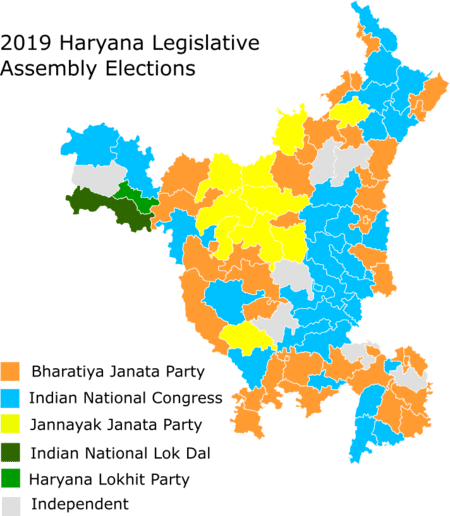
What Makes an Election Democratic?
The reasons why elections are democratic:
- Universal Adult Franchise: Every adult has the right to vote, and each vote holds equal value.
- Multiple Parties and Candidates: People have the freedom to choose from various parties and candidates.
- Regular Elections: Elections are held at fixed intervals.
- People's Choice: Candidates preferred by the majority are elected.
- Fair and Free Environment: Elections are conducted without bias or manipulation, ensuring a democratic process.
Is it good to have Political Competition?
Demerits
- Creates a sense of disunity and ‘party politics.
- Parties level allegations against each other of using dirty tricks to win elections.
- Long-term policies cannot be formulated.
- Good people do not enter politics.
Merits
- Elections are good because they force the ruling party to perform.
- The government is aware that it will be voted out of power if it does not perform as the people expect.
- It forces parties and leaders to perform, so competition is good.
What is our System of Elections?
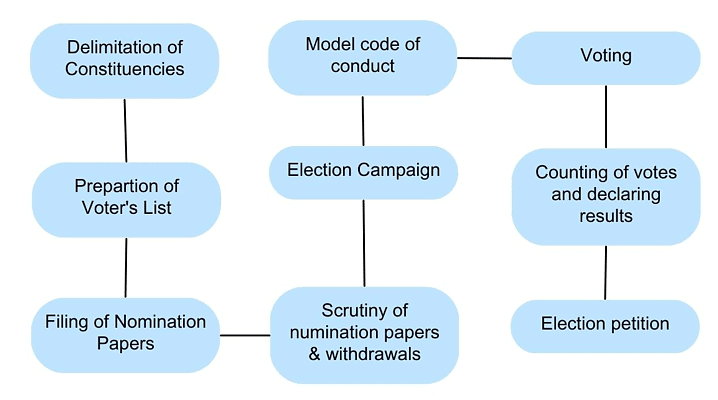 System of Elections
System of Elections
- Compilation of voters list.
- Announcement of election date.
- Division of the country into constituencies for Lok Sabha and state assemblies.
- Election of Members of Parliament (MPs) from 543 Lok Sabha constituencies.
- Election of Members of Legislative Assembly (MLAs) within each state.
- Declaration of party manifestos and nomination lists.
Electoral Constituencies
- Electoral constituencies are areas in India divided for election purposes.
- Each constituency elects a representative for the area.
- There are 543 constituencies for Lok Sabha elections, resulting in 543 MPs.
- Ideally, each constituency should have an equal number of voters.
- In practice, maintaining voter balance across constituencies is challenging.
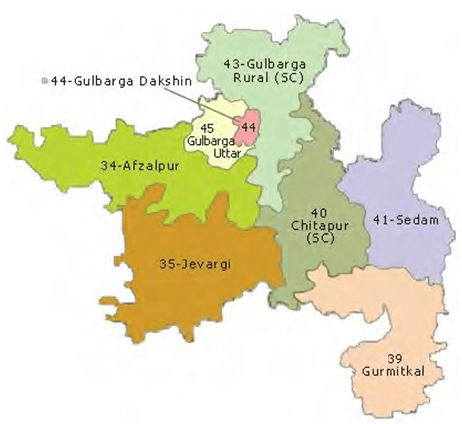 Gulbarga Lok Sabha Constituency
Gulbarga Lok Sabha Constituency
Reserved Constituencies
- True democracy aims for equal opportunity in elections and governance.
- Weaker sections (SCs, STs, OBCs, women) exist due to historical, social, cultural, and economic factors.
- A level playing field is needed for meaningful electoral competition.
- Reserved constituencies provide this level playing field for weaker sections.
 Reserved Parliamentary constituencies for SC-St (2008)
Reserved Parliamentary constituencies for SC-St (2008)
Question for Key Concepts - Electoral PoliticsTry yourself:What does the term 'constituency' refer to in the context of electoral politics?
View Solution
Voters' list
The voter's list, or electoral roll, comprises citizens aged 18 and above with universal suffrage, irrespective of caste, religion, or gender. Exceptions exist for individuals with unsound minds and criminals. Voter identification is facilitated through a government-issued Election Photo Identity Card, serving as a crucial identification document during polling.
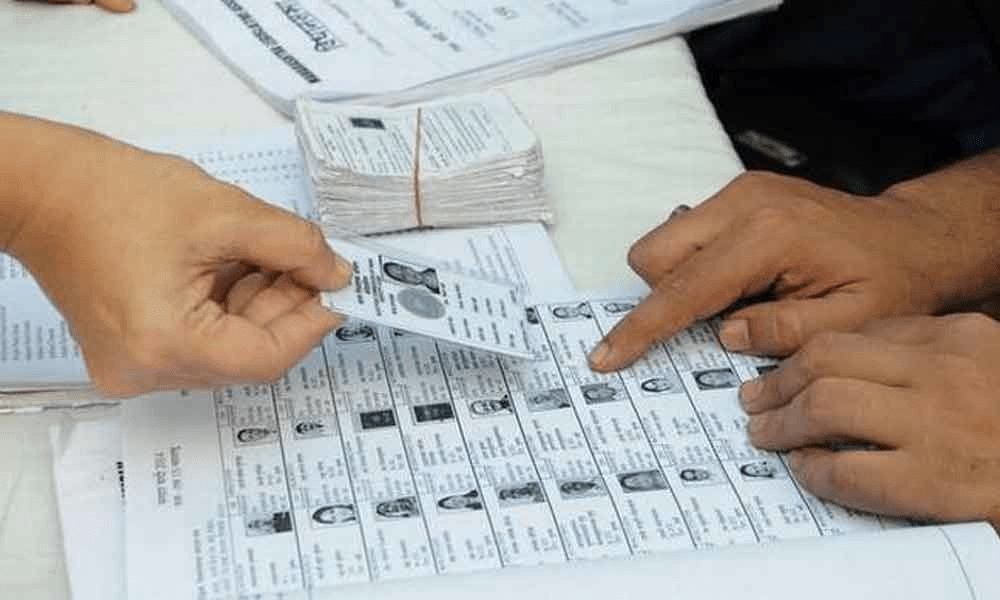 Voter's List at the time of the Election
Voter's List at the time of the Election
Nomination of Candidates
- Citizens aged 25 or above can nominate themselves by submitting a form and a security deposit, declaring any pending serious criminal cases.
- This transparency in the nomination process informs voters for better decision-making.
Election Campaign
- Election campaigns in India aim for a free and open discussion to determine the best representative and the party likely to form a superior government, taking place over two weeks between the final candidate list announcement and the polling date.
- India's election law prohibits bribery, caste or religion appeals, misuse of government resources, and sets spending limits. Violations can lead to court rejection of election results.
- Political parties adhere to a Model Code of Conduct, which restricts the use of places of worship, government vehicles, and officials during election campaigns. Ministers are restrained from major policy decisions or promises once elections are announced.
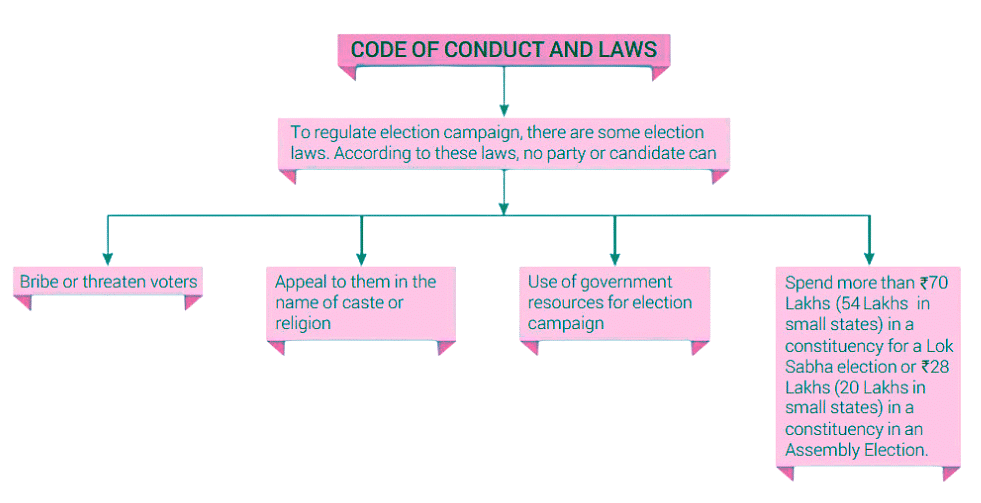
Polling and Counting of Votes
- Election day, when voters cast their votes, involves going to a nearby polling booth.
- Upon entering, officials identify voters, mark their fingers, and permit them to vote.
- Each candidate has an agent inside the booth to ensure fair voting procedures.
A ballot paper is a sheet of paper on which the names of the contesting candidates, along with party names and symbols, are listed.
The ballot paper was used earlier. Nowadays, electronic voting machines (EVM) are used to record votes.
- The machine shows the names of the candidates and the party symbols.
- The voter has to press the button against the name of the candidate she wants to give her vote to.
 Representation of EVMs
Representation of EVMs
- Once the polling is over, all the EVMs are sealed and taken to a secure place.
- A few days later, all the EVMs are opened and the votes secured by each candidate are counted.
- The candidate who secures the highest number of votes from a constituency is declared elected.
What Makes Election in India Democratic?
 Factors which make election in India Democratic
Factors which make election in India Democratic
- Universal adult suffrage: In India, every citizen above the age of 18 has the right to vote, ensuring equal participation in the electoral process.
- Multiple political parties: India has a multi-party system, allowing voters to choose from a wide range of candidates and political ideologies.
- Regular elections: Elections in India are held at regular intervals, with the general elections taking place every five years.
- People's Choice: The candidates who receive the highest number of votes are elected, reflecting the will of the majority of the people.
- Free and fair elections: The Election Commission of India ensures that the electoral process is conducted in a transparent and impartial manner, with strict adherence to rules and regulations.
- Secret ballot: The voting process in India is carried out through a secret ballot, ensuring that voters can make their choices without fear or coercion.
Independent Election Commission
The Election Commission in India, headed by the Chief Election Commissioner appointed by the President, holds extensive powers. It manages all election aspects, enforces the Code of Conduct, and directs government actions during elections to prevent misuse of power. Government officers on election duty operate under the EC's control, ensuring its independence.
Popular Participation
In India, elections are conducted by the independent Election Commission (EC), led by the Chief Election Commissioner (CEC) appointed by the President. Key aspects that make elections democratic in India include:
- EC's control over all aspects of elections, from announcement to declaration of results
- Implementation and enforcement of the Code of Conduct
- Issuing guidelines for the government during elections
- Ensuring government officials work under EC control while on election duty
Acceptance of Election Outcome
 Sealed EVMs
Sealed EVMs
- EVMs from each area are opened on a fixed date, ensuring transparency.
- Election outcomes serve as a test of freedom and fairness.
- Ruling parties frequently lose elections at national and state levels.
- Incumbent representatives often lose elections, indicating competitiveness.
- Candidates spending excessive money or with criminal connections can lose elections.
- Electoral outcomes are generally accepted as the 'people's verdict' by defeated parties.
Challenges to Free and Fair Elections
Indian elections, predominantly free and fair, face challenges: Challenges to Free and Fair Elections
Challenges to Free and Fair Elections
- Money and influence: Wealthy candidates hold an advantage, but it doesn't determine election outcomes.
- Criminal connections: Candidates with criminal backgrounds may secure party tickets but aren't guaranteed victory.
- Family connections: Some candidates receive tickets due to family ties, yet voters ultimately decide their fate.
- Limited choices: Major parties may align, but voters can opt for smaller parties or independents.
- Disadvantage for smaller parties: Despite resource disparities, smaller parties and independents contribute to the democratic process.
|
53 videos|437 docs|80 tests
|
FAQs on Key Concepts - Electoral Politics - Social Studies (SST) Class 9
| 1. What is the significance of elections in a democratic country like India? |  |
| 2. How are electoral constituencies determined in India? |  |
| 3. What are the key steps involved in the election process in India? |  |
| 4. What challenges do free and fair elections face in India? |  |
| 5. What role does an election campaign play in the electoral process? |  |

|
Explore Courses for Class 9 exam
|

|


















